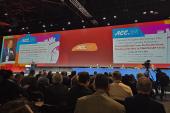More Support for Ticagrelor Monotherapy After PCI, Especially in ACS
While some would like to see practice change to dropping aspirin earlier, these decisions will likely depend on individual patients.

Compared with continuing dual antiplatelet therapy (DAPT) for 12 months after PCI, de-escalation to ticagrelor monotherapy reduces the risk of bleeding without increasing the risk of ischemic events, according to a new meta-analysis. The benefit appears to be driven by patients with acute coronary syndromes (ACS).
With an arsenal of trials now complete in this space—most recently ULTIMATE-DAPT but also T-PASS, TICO, TWILIGHT, a post hoc analysis of GLOBAL LEADERS, and different meta-analyses—dropping aspirin early in these patients has become a more accepted practice, albeit slowly.
This new study represents the totality of the evidence available and suggests “that ticagrelor monotherapy is a preferable treatment option over DAPT in patients with ACS, but not necessarily in patients with CCS [chronic coronary syndromes], given the uncertain preservation of ischemic benefit and bleeding risk mitigation profile in patients with CCS,” lead author Marco Valgimigli, MD, PhD (Cardiocentro Ticino Institute, Ente Ospedaliero Cantonale, Lugano, Switzerland), and colleagues write in the September 7, 2024, issue of the Lancet.
“Conversely, the relative risk of major bleeding was consistently reduced by more than 60% in patients with ACS both with and without high bleeding risk features,” they add. “This observation suggests that de-escalation to ticagrelor should not be reserved to patients at a high risk of bleeding, but rather offered to the entire spectrum of patients with ACS.”
Commenting on the analysis for TCTMD, Ajay Kirtane, MD (NewYork-Presbyterian/Columbia University Irving Medical Center, New York, NY), said the findings are largely confirmatory. One advantage here is that the study goes above what the individual trials were able to show with regard to “theoretically underpowered” endpoints like ischemic events and thus helps cardiologists “feel more confident that there's not an ischemic price to pay for the de-escalation,” he added.
“The lessons that we're learning pretty clearly from all of these studies together are that the more antiplatelet or antithrombotic therapy as a whole that you have, the greater the bleeding risk,” Kirtane continued. “So, if you can peel off antithrombotics, you're going to lower bleeding. What is nice to see is that we're not incurring an excess ischemic risk in doing so.”
SIDNEY-4 Findings
For the SIDNEY-4 study, which was presented at the 2024 European Society of Cardiology Congress, Valgimigli and colleagues included more than 24,000 patients (mean age 64 years; 23% female; 74% with ACS) from six trials that randomized patients to ticagrelor monotherapy after a median of 78 days or continued DAPT following coronary stenting:
- GLASSY
- SMART-CHOICE
- TICO
- TWILIGHT
- T-PASS
- ULTIMATE-DAPT
After a median follow-up of 334 days, the rate of MACCE (a composite of all-cause death, MI, or stroke) was lower in patients on ticagrelor monotherapy compared with those taking continued DAPT (2.8% vs 3.2%; HR 0.91; 95% CI 0.78-1.07; P = 0.0039 for noninferiority).
BARC 3 or 5 bleeding was decreased for patients who dropped aspirin (0.9% vs 2.1%; HR 0.43; 95% CI 0.34-0.54; P < 0.0001), as was the risk for all-cause death (0.9% vs 1.2%; HR 0.76; 95% CI 0.59-0.98; P = 0.034). There were no differences in the risks for stroke or stent thrombosis between the treatment arms.
In a trial sequential analysis, the researchers showed “strong evidence” of noninferiority for MACCE and superiority for bleeding among all patients as well as specifically the ACS population.
Additionally, they found possible benefits for women compared with men in favor of ticagrelor monotherapy regarding both MACCE (P = 0.041 for interaction) and all-cause death (P = 0.050 for interaction) and for patients with ACS compared with CCS with regard to bleeding (P = 0.022 for interaction).
If you can peel off antithrombotics, you're going to lower bleeding. Ajay Kirtane
“We think we provide conclusive evidence that DAPT de-escalation to ticagrelor monotherapy at a median of 2 weeks, or maximum 3 months, after DES implantation preserves the fatal and nonfatal ischemic [risk] and halves major bleeding risk compared to the standard of care consisting of 1-year DAPT,” Valgimigli said in his presentation. “Our results were confirmed in ACS patients, and in fact were driven by ACS patients, and there was a significant, albeit inconclusive, mortality benefit with ticagrelor monotherapy, particularly among females, which warrant further investigation.”
While he said his practice had already shifted prior to this meta-analysis to dropping aspirin earlier, Valgimigli said “based on this study, the evidence base for changing practice is becoming very solid to the point that probably the guidelines should change accordingly.”
Session co-moderator Tiffany Patterson, MBBS, PhD (Guy's and St Thomas' NHS Trust Hospitals, London, England), agreed on the shift in thinking. “We've certainly seen something similar as well in our practice,” she said.
Notably, Valgimigli said, the findings cannot be generalized to clopidogrel monotherapy. “If you de-escalate and you go from two antiplatelet therapies and then you embrace only one, you better be sure that the single one that you leave on board is actually effective. And that cannot be said for clopidogrel in some patients.” As for prasugrel, there is still not enough data to say, but it would “probably do the same thing” as ticagrelor, he said.
Asked whether the findings could apply to all stent types, Valgimigli said there is likely a class effect, although they did not look into it. “It's time to abandon this stent-specific mentality,” he said. “If you look at the rate of stent thrombosis across all included studies, it's 0.1%, 0.2% at 1 year. So there is actually no reason to be concerned about a specific DES side effect.”
When and in Whom?
In an editorial accompanying the Lancet paper, Giulio Stefanini, MD, PhD, and Angelo Oliva, MD (both Humanitas University, Milan, Italy), write that the study “marks another milestone in the journey from the era of fear about thrombosis after stent implantation to a more balanced phase of awareness of the trade-off between ischemic events and bleeding complications associated with antiplatelet therapy.”
They acknowledge that this progress is in part due to advances in stent and procedure technology “which have progressively enabled the safe modulation of antithrombotic therapy in terms of duration and combinations of agents.”
The question of when to drop the aspirin still isn’t clear, however, Kirtane said. “One of the challenges is that most of the studies were 3 months, so is 1 month going to be sufficient? I think for lower-risk patients, likely yes. For the highest-risk patients, probably the jury is still out a little bit on that.”
David Fischman, MD (Thomas Jefferson University Hospitals, Philadelphia, PA), who was not involved in the study, told TCTMD that it does help a little bit in this regard.
“We already knew this to some extent that probably in high-risk bleeding patients, we could probably stop it at 1 to 3 months and be okay without a higher bleeding risk and without an increase or change in MACE overall,” said Fischman. But other meta-analyses have shown slightly different findings than what was seen here, leaving a bit of ambiguity as to when is the exact right time to make the change, he added.
Another randomized trial in this space would answer the question as to precisely when it’s the right time to drop aspirin, especially in ACS patients, but Fischman acknowledged this is unlikely to happen. “We've been brought up to believe 12 months [is best], and in some individuals, you could stop it at 6 months,” he said. “This is why I think it will take a little while for everybody to buy into this.”
More meta-analyses are likely to keep coming, but Fischman said he’d like to see all the data inputted into an artificial intelligence tool that will help with personalized decision-making based on the patient’s bleeding and ischemic risks.
Kirtane agreed that there is unlikely to be another randomized trial and cautioned against what others have already termed “DAPT fatigue.” More than additional trials, he said, what’s needed is “some consolidation of clinical pathways because there's a lot of confusion around this and there are a lot of labs where it's part of the cath report, [where] a standard recommendation is issued. As long as those are updated to basically titrate what you're doing DAPT-wise to the patient or titrate what you're doing from an antithrombotic therapy to the patient, then that's going to be the best way to proceed.”
He also noted the importance of resuming aspirin in patients told to stop their ticagrelor prior to surgery. “From a public health standpoint, that's the only thing that gives me pause with some of the monotherapy studies,” Kirtane said.
Yael L. Maxwell is Senior Medical Journalist for TCTMD and Section Editor of TCTMD's Fellows Forum. She served as the inaugural…
Read Full BioSources
Valgimigli M, Hong S-J, Gragnano F, et al. De-escalation to ticagrelor monotherapy versus 12 months of dual antiplatelet therapy in patients with and without acute coronary syndromes: a systematic review and individual patient-level meta-analysis of randomised trials. Lancet. 2024;404:937-948.
Stefanini GG, Oliva A. Is this the conclusive evidence for ticagrelor monotherapy in acute coronary syndromes? Lancet. 2024;404:908-909.
Disclosures
- Valgimigli reports receiving grants or contracts from Om Pharma and Concept Medical; consulting fees from Astrazeneca, Biotronik, Chiesi Pharma, Om Pharma, Abbott Vascular, Terumo, Concept Medical, Daiichi Sankyo, Idorsia, Novartis, Johnson & Johnson, Janssen, Alvimedica, and Vesalio; and support for attending meetings or travel from Edwards Lifesciences.
- Kirtane reports receiving grants from Amgen and consulting or speaker fees from Medtronic, Boston Scientific, Abbott Vascular, Amgen, CSI, Philips, ReCor Medical, Neurotronic, Biotronik, Chiesi, Bolt Medical, Magenta Medical, Canon, SoniVie, Shockwave Medical, Merck, IDMS, Medtronic, CathWorks, Edwards, Novartis, Abiomed, Zoll, and Regeneron.
- Fischman, Stefanini, and Oliva report no relevant conflicts of interest.





Comments